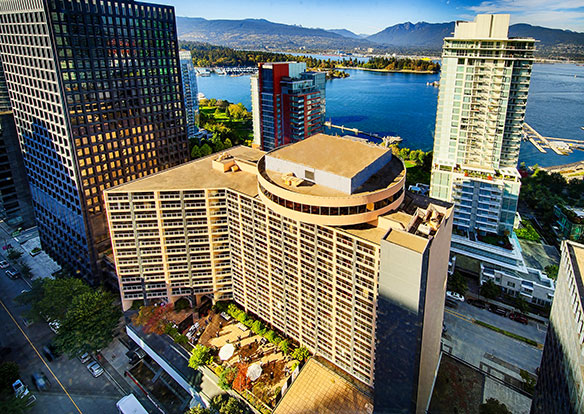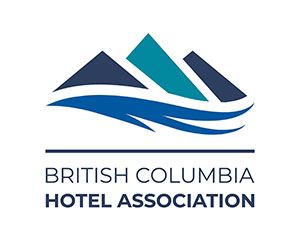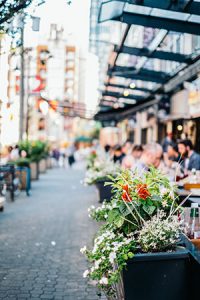
Don’t look back
A conversation with Ingrid Jarrett, president and CEO of the BC Hotel Association

In the final part of CTP’s conversation with Ingrid Jarrett, the president and CEO of the BC Hotel Association, she talks about hospitality and the challenges that the province’s hotel industry faces going forward.
Hospitality has always been synonymous when people talk about the hotel industry. But I’m wondering whether COVID-19 may have made it difficult to use that word when talking about a stay in a hotel going forward. Can you comment on this?
Hospitality will always be synonymous with the hotel industry even during this challenging pandemic-era; the accommodation industry has provided safe shelter for thousands of years and will continue to do so.
When we initially felt the effects of COVID-19 in Canada, the first request from the government, both federally and provincially, was to ask hotels to provide safe shelter and sustenance to our communities, particularly to essential workers and those in need.

Ingrid Jarrett
Hoteliers have an intense loyalty to their communities and our industry stepped up immediately to assist.
Even during this time where heightened health and safety protocols have been pushed to the forefront of conversation, caring for our guests remains at the centre of our commitment and is the pride of what we do.
There are so many new rules and new requirements of behaviour either in place or recommended due to the pandemic, can you talk about the kind of challenge (or challenges) they present to the hotel industry.
Frequent hand washing, increased disinfection of high-touch areas, physical distancing and staying home if you’re not feeling well continue to be guiding best practices for all industries during this pandemic.
Our sector has also added confirming these new practices, and then some, before and during guest check-in. Furthermore, our industry has also had to adjust day-to-day procedures that have caused some operational hurdles like having to leave increased time between guest stays for sufficient air exchange, adjusting room service practices, the use of PPE equipment during guest interactions etc.
While implementing and training staff on these new procedures have presented challenges, our industry has openly embraced the best practices to protect the safety of staff, guests and community.
If there are others that are challenging for the hotel industry in BC can you talk a little about those?
As travel restrictions have been detrimental to our sector and tourism industry at large, it would be beneficial for BC to develop travel bubbles with other regions.
This would mean opening travel corridors with destinations around the world who have demonstrated equal responsibility in the face of COVID-19 and maintain significantly low infection rates, allowing international travel to reopen to a controlled degree.
There are opportunities to have a destination to destination bubble approach to international demand based on the specific interests and the products that are available.
Such examples could be luxury remote mountain lodges, fishing lodges, heli-hiking or wilderness resorts. This could be implemented through partnerships with airlines and other organizations and would deliver a completely closed risk factor to the public.
In addition, hosting meetings over 50 people in a purpose-built hotel with specific protocols to support traceability is entirely possible.
 This will be an important step for our organization as we work toward ensuring that hotels that retain much of their revenue through corporate meetings and conventions can remain solvent.
This will be an important step for our organization as we work toward ensuring that hotels that retain much of their revenue through corporate meetings and conventions can remain solvent.
There is an urgent need to move the economic recovery along. People need to work. Businesses need to operate. But I’m wondering how you see the balance between that urgency and the social responsibility that we (people and businesses) now have to protect each other from the spread of COVID-19. Can you comment on this? How is the BC hotel industry approaching this dilemma?
The wage subsidy is and will continue to be the most impactful tactic to ensure people can get back to work. Increasingly, we have heard that CERB is becoming problematic.
Many hotels that have been able to reopen have reported that their employees would prefer to collect government support than go back to work. It would be beneficial for this to transition to an EI program to show that when individuals are offered work in a safe environment, that there is a responsibility amongst the employees to respond.
In addition, work sharing holds enormous potential to support the restart of the economy – many people working part time is better than a few people working full time.
Going forward, I’m wondering how you see this industry recovering. Will it just go back to the way things were at the beginning of 2020? Or will COVID-19 reshape the hotel business and travel and tourism? What’s your vision?
I do not believe that things will be the same as they were before COVID-19. Public confidence has been seriously compromised. While it is going to be a long, slow recovery, it would actually be a disservice for our industry to try and go back to the way things were.
High fixed costs, labour costs, commissions for business acquisition, taxes, among other things have plagued our industry and have been the perfect storm for insolvency.
While COVID-19 has been damaging for our sector, it has presented an opportunity to ensure hospitality is understood and valued for its contribution.
Historically, banks, government of all levels, and other industries, completely disregarded this sector for its contribution to communities across our province and the economy.
It is our job, as we recover, to ensure we are communicating our contribution, which spans much more than GDP.
Small businesses are the backbone of the Canadian economy and are integral to helping communities prosper.
The entrepreneurial spirit of our industry cannot be understated. While we are resilient and determined, we still need relief from the burden of fixed costs.
A follow up, has the BC Hotel Association been doing any tracking of consumer attitudes to stays in hotels during a pandemic. If you have, can you share some of the findings from that intelligence? If it hasn’t, maybe you can share some of the conversations, anecdotal observations of the association’s members on how consumer behaviour has been or is being changed by COVID-19?
 Consumer confidence is not being tracked by our association, however, the provincial government and Destination BC is tracking it bi-weekly.
Consumer confidence is not being tracked by our association, however, the provincial government and Destination BC is tracking it bi-weekly.
It is important to note, hoteliers are held to a high standard to provide for safe and clean accommodation experiences. We are caring, friendly and accommodating hosts and this will not change. We have been highly responsible, working with the government and WorkSafe BC to ensure we can once again welcome guests and travellers to British Columbia.
Guests can have full confidence in knowing that we have their safety top of mind and are doing all that we can under very dire circumstances to create warm, safe, memorable experiences in hotels. Properties across the province have been inspected randomly by a third-party agency. And as a representative of our industry, I can proudly say that we are doing an outstanding job ensuring that protocols have been safely and effectively implemented. The more we can display our dedication to our guests and positive sentiments, the more consumer confidence will grow, leading to a travel restart.
Our industry has always been held to a high standard and we continue to invite travellers from BC to trust that we have their best interests at heart.
Last question: what keeps you up a night?
The lack of understanding from all levels of government regarding how dire the current impact COVID-19 has had and continues to have on our industry. I worry that many businesses will not survive if we don’t save our summer, and fall.
